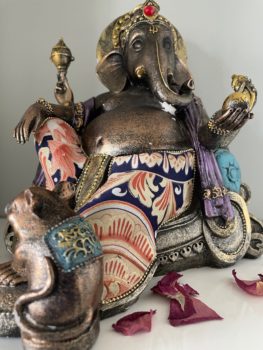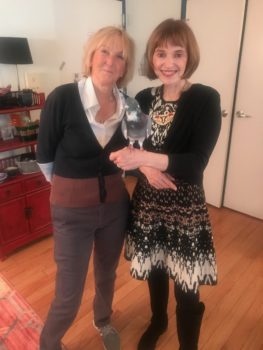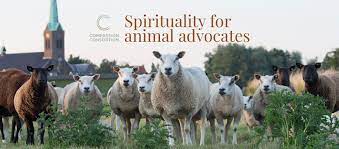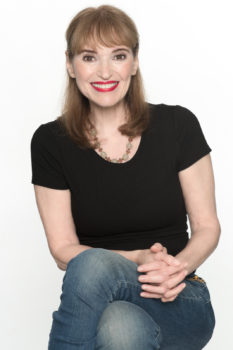“My religion is based on truth and non-violence. Truth is my God. Non-violence is the means of realising Him” ~ Mahatma Gandhi

I was in the lunch line at Kripalu, my first time at this yoga retreat in the Berkshires that I’d heard about since the 1970s. I knew they’d gone through a major restructuring some years back and one of the concessions they made to stay in business was adding meat, fish, and eggs to their previously lacto-vegetarian menu. With this background information, it wasn’t the fact that meat was offered that threw me. It was that there were two lines, one marked “Main Buffet,” the other, “Vegetarian Buffet.”
This is a yoga retreat. While only slowly and painstakingly opening to veganism, yoga and its communities throughout the centuries have been vegetarian. The idea that the meat-eating norm would ever be seen as “Main” at a yoga institute would never have crossed my mind.

I used to feel that same at the Unity Inn, on the grounds of Unity World Headquarters outside my hometown of Kansas City. While I was seventeen when I discovered yoga, I knew about the progressive Christian movement, Unity, from before I could toddle. My grandmother-aged nanny (and first spiritual teacher) took me to church with her at Unity, and I learned to read before kindergarten from their devotional magazine, Daily Word, published to this day. Unity was founded in the 1890s by devoted vegetarians Charles and Myrtle Fillmore. They were as close to vegan as people got before the concept was codified in the 1940s, and they were vocal about it. The Unity Inn was one of the nation’s first vegetarian restaurants and at its zenith in the mid-1920s, was serving nearly 2,000 meals every day with no animals on the menu.

But Mrs. Fillmore passed away, and late in life Mr. Fillmore went back to eating fish. The Inn had gone quasi-vegetarian in the 1930s and by the time I was frequenting it as a twenty-something searching for God as if that’s what what I was born to do, it had become a meat-centered cafeteria with one vegetarian entree featured daily.
It seemed like such a backward turn as the secular world was opening to vegetarian ideas in the late 20th century. And as veganism grows by grand jetés in the 21st, religious and spiritual communities, the very places that once kept the notion of compassionate food choices alive in the West, have lost ground on carrying this message for close to a century. There are exceptions to this, of course, but by and large, the idea of dining with concern for God’s creatures is coming not from clergy and cloisters but from organizations such as Peta (founded by my favorite atheist, Ingrid Newkirk), and companies such as Beyond Meat, Miyoko’s Kitchen, and Just Egg.
It perplexes me no end when spiritual communities with so much to recommend them ignore, avoid, and even disavow including so-called “farm animals” within the scope of Divine love and protection. Some years ago, I was a member of the Society of Friends (Quakers). What a beautiful faith! Quakers believe in direct revelation, that the Divine can communicate with any of us, no intercessories required, and they stand for peace and nonviolence. I knew that not all Quakers were vegetarian. We come to things in our own time. But when I learned that their exemplary boarding school in Iowa, Scattergood, featured an “organic farm” and slaughtered 200 pigs, cows, sheep, and turkeys every year, I was left shaken. If these stalwart pacifists, people with enough conviction to face a lone gunman or a full battalion and not react with violence, see no harm in killing innocent animals for the pleasure of the palate, what hope is there for the rest of humanity to be truly humane?

Well, as it turns out, there is quite a bit. It’s just rarely in the context of religion or codified spirituality. The Seventh Day Adventists, God bless them, have never backed down on recommending a vegetarian or vegan lifestyle. Rev. Shad Groverland, executive director of Unity Worldwide Ministries (that arm of the Unity movement established to support its churches) is vegan and doesn’t shy away from sharing that. There’s a lovely denomination founded in the UK in 1904 called The Order of the Cross, based on the oneness of life and the unity of all religious aspirations. Peacemaking and a vegetarian or vegan lifestyle are among as its fundamental tenets. The Unitarian Universalists have active animal, environmental, and vegetarian/vegan groups beneath the larger denominational umbrella. Mahayana Buddhism has retained its vegetarian roots, as has Jainism. A great many Hindus are also vegetarian. And Israel has the most vegans per capita of any nation on earth — believed to be due in part to Jewish teachings and in part to the indomitable spirit of a young nation.

I’m sure there are other examples, as well, but generally, veganism and animal rights are secular to their core. And tragically, animal cruelty in the name of religion is common around the world:
- Indian-born filmmaker Sangita Iyer has made it her mission to do away with the abuse of thousands of elephants for religious celebrations in her native country.
- Some Hasidic groups use chickens in an annual ceremony called Kaporos, spinning the birds around their heads as a way of transferring the human’s sins onto the chicken. Many suffer broken wings and all are slaughtered after the ceremony, with the meat ostensably donated to the poor.
- In Islam, every year during the month of Dhul Hijjah, the Biblical story of Abraham’s sacrifice of a sheep in lieu of his son is remembered with the injunction that every Muslim slaughter (or, in modern times, pay someone to slaughter) a sheep, goat, cow, or camel; one-third of the meat must be given to the needy.
- Animal sacrifice is still found in Santeria and the Youruba relgion of West Africa.
- And across America, churches sponsor barbecues, pig roasts, rodeos, and the like. These are often the same churches that, around the time of St. Francis’s birthday in early October, hold a Blessing of the Animals ceremony, an event largely reserved for the dogs, cats, hamsters, guinea pigs, parakeets, et al, who are part of human families.
Because of all this, and because vegans and animal advocates in all these communities attempt to be a voice for other-than-human beings, and because the deepest teachings within all traditions recognize the oneness of life, the Compassion Consortium was born. My husband, Rev. William Melton, along with two other Interfaith ministers, Rev. Sarah Bowen and Rev. Erika Allison, plus my-layperson-self started this spiritual home, or spiritual second home, for those whose circle of compassion includes all beings. We welcome everyone, regardless of where they are on their path, to our services, and we invite into membership all whose values align with those expressed in our Tenets of Agreement.There are no rules proffered and no judgments made. Nobody is going to show up and check what’s in your closet or your fridge. We come together to support people who love animals and those who hate cruelty, to celebrate the teachings of love and nonviolence in all wisdom traditions, and to inspire those in our community who are also part of a church, synagogue, mosque, temple, or other religious body to shine the light of compassion for all in these contexts, too.

Although I’m not sure most of our members or even the other three founders would describe us this way, but I see the Compassion Consortium as a collection of mystics, or mystics-in-the-making. While some people have been led to believe that this word applies to the magical, even the woo-woo, a mystic is, in fact, a remarkable person — or a remarkably blessed person — who has an experience of God realization.
Whatever their culture or belief system, such people come to know that we are all one because God or a Higher Power or the Force from Star Wars is all and everything. We know the names of some of these people: St. Theresa of Avila, Walt Whitman, Meister Eckhart, J. Krishnamurti, Rumi, Jane Goodall, William James, Karl Jung, C.S. Lewis, Henry David Thoreau. Most, however, are private people, like my sister-in-law, Rita Moran, who had a such an experience and reported afterwards: “The only way I can explain it is to say that we are dust and we are divine, and there is a place in consciousness at which those are not even contradictory.”
But even without the Big B.V. (beatific vision, the term often used to describe this experience in Catholic tradition), we sense the mystical whenever we look into the eyes of another being and realize that they are windows not just to the soul of that person or dog or cow, but to what Emerson called the Oversoul, what Hinduism calls Atman, the Divine within. There is a core of the mystical within all the world’s traditions. It starts where the rules and the separateness and the arguments stop. It’s ever alive and ever growing. It excludes no one of any species.
 Victoria Moran has been intrigued by the mystical since childhood. She earned a degree in religious studies, summa cum laude, from North Central College. While there, she was awarded a Richter Fellowship, resulting in her first book, Compassion the Ultimate Ethic: An Exploration of Veganism. Twelve additional books have followed. Victoria is a cofounder of the Compassion Consortium, an interfaith spiritual center for animal advocates, with celebration services monthly via Zoom. The special guest June 26 will be Nathaniel Altman, theosophist and author of books including The Nonviolent Revolution. June’s Compassionate Book Night (the 14th) will celebrate Pride Month and feature Our Hen House cofounder, Jasmin Singer, and her books Always Too Much and Never Enough, and The VegNews Guide to Being a Fabulous Vegan.
Victoria Moran has been intrigued by the mystical since childhood. She earned a degree in religious studies, summa cum laude, from North Central College. While there, she was awarded a Richter Fellowship, resulting in her first book, Compassion the Ultimate Ethic: An Exploration of Veganism. Twelve additional books have followed. Victoria is a cofounder of the Compassion Consortium, an interfaith spiritual center for animal advocates, with celebration services monthly via Zoom. The special guest June 26 will be Nathaniel Altman, theosophist and author of books including The Nonviolent Revolution. June’s Compassionate Book Night (the 14th) will celebrate Pride Month and feature Our Hen House cofounder, Jasmin Singer, and her books Always Too Much and Never Enough, and The VegNews Guide to Being a Fabulous Vegan.


Love ❤️ the photo of you with Thunder & Ypur infinitely compassionate twin Ingrid Newkirk
What a wonderful post, Victoria!! You are so wise. I love that quote from Mahatma Gandhi.🧡
I have followed your work for 40 years and I still find inspiration in your life-rock on!
This is the most beautiful compliment I have ever received! Thank you so very much, Ellen.
Dear Victoria, I love your articles and this one is especially meaningful. I’m the one who met you and your young daughter many years ago (Addair was about 12) when I visited Kansas City and have maintained contact with you through your writings — including most of your books. Thank you for the wonderful work you continue to do to promote the great benefits of veganism.
Thoughtfully conceived and eloquently written, thank you!
Coming from you — one of the best writers I know — this means an awful lot. Thank you, Mark.
Dear Victoria,
I cannot thank you enough for the work that you do, and for this blog post.
I was very active with Kripalu for many years, but could no longer support the community once they sold out. Now the meat and dairy offerings far exceed vegan options, and really the only truly healthy food was offered in a tiny back corner of the cafeteria called the “Buddha Bar.”
The rest is junk-food vegan/vegetarian at best.
They also began letting people use their cell phones everywhere, as well as making coffee available most of the time. All moving away from the very things that made it a retreat center and a place to offer true challenge to the mind and body and spirit. So sad.
When I asked their rationale, they said it was “to accommodate all types of people at all stages of spiritual development, including guest’s spouses who may not yet be on the path.” They framed it as though they were being inclusive and non-judgmental, as a way to expand their reach – quite a spin for a “yoga retreat center.” Thank you again.
Hi, Amy … and thank you for your kind and thoughtful comment. In my role as a cofounder of the Compassion Consortium, we struggle with the ‘how often should we say ‘Vegan'” conundrum. On the one hand, half our raison d’etre is to support Vegans who are looking for a spiritual home that celebrates ahimsa, so we want to shout it from the rooftops. But on the other, we hope to invite and support the growth of not-yet-Vegans, many of whom are put off, frightened even, by the V-word. What we’ve come to for now is to welcome everyone and yet provide an unapologetically Vegan space. During our services, all presenters are Vegan. The practice of ahimsa to the highest degree possible is encouraged, without shaming those who aren’t there yet (and realizing that none of us is ever really “there”). It’s quite a dance.
As for Kripalu, what has happened there makes me wonder about the concept of “retreat.” I always thought that meant going somewhere to stretch — not just with yoga postures but to stretch my thinking, my discipline, my resolve. I’ve done silent retreats (I love to talk) and fasting retreats (I despise fasting!) and extensive meditation retreats (in real life, I can manage 20 minutes twice a day on a good week) … All of those retreat experiences were to take me beyond my comfort zone. That’s why I shelled out the money, temporarily uprooted my life, and went somewhere different (usually to the country and I am a very urban creature).
But I sense that there is more fear in people’s lives now than ever. Thirty years ago, the idea of doing something different, even when it involved a challenge or some discomfort, real or perceived, was tantalizing for lots and lots of people. Today it seems that anything challenging is terrifying. I’m not sure what happened.
I could go on and on — thanks for the impetus to do more thinking on this. Have you found a wonderful place to go to replace Kripalu? My retreat budget for this year is used up — Kripalu in April, and the Return to Eden retreat at Unity Village, Missouri, coming in late October — but it never hurts to plan ahead. Hari om, my friend.